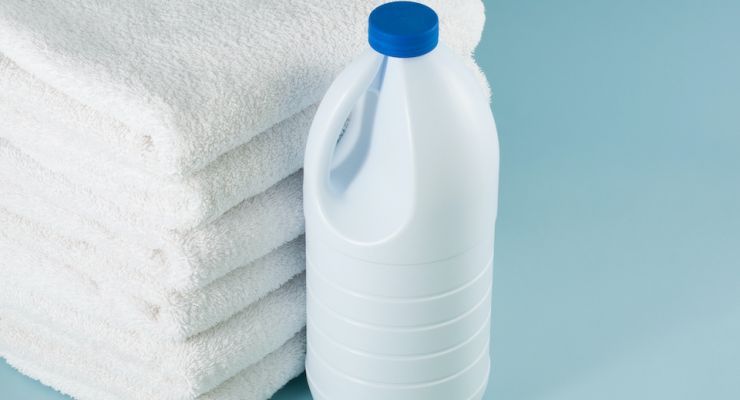Did you know that using bleach more than once a week could increase your risk of developing a fatal lung disease? Bleach may be a safe bet when it comes to killing germs; but when it comes to health, bleach can be downright dangerous. You’re not limited to using bleach as a disinfectant. There are alternatives — all natural, safe, and just as effective. Here are six reasons to stop using bleach and what you can use instead.
Bleach has a high rate of poisoning injuries among children
Household disinfectants are dangerous, especially to children. According to a pediatrics study, the number of injuries linked to household cleaning products decreased by 46 percent between 1990 to 2006. However, the number of children still being treated in US hospitals — for cleaning product-related injuries — is high. And, the product most-commonly related to injury is bleach. Since children’s lungs are still developing, they are more vulnerable when breathing bleach vapors.
Breathing-in bleach devastates the lungs
Using bleach just once a week could increase your risk of developing chronic obstructive pulmonary disease by as much as 32 percent, suggests research. In fact, regular use of bleach and other commercial disinfectants have been linked to a higher risk of fatal lung disease. A 30-year study by Harvard University and the French National Institute of Health and Medical Research found that people who used bleach even once a week have a high chance of developing the condition.
And while undiluted bleach is very strong and dangerous when inhaled, so is diluted bleach, according to research. When you spray diluted bleach, you create small droplets — or an aerosol mist — that can easily be inhaled into the lungs. Aerosol forms of bleach get into the airway, where it can cause asthma or trigger asthma attacks.
Bleach is not a cleaner – it’s a disinfectant
If you’ve been using bleach as a cleaning agent, you’ve been doing it all wrong. Bleach, according to research, is neutralized by dirt and other organic matter. Therefore, it’s not very effective when used on any surface that hasn’t been cleaned first.
Using bleach causes episodes of asthma
It’s well documented that people who work with bleach daily often suffer adverse respiratory health effects. However, when it comes to regular household use, there’s always been a question: What role, if any, does bleach play on asthma? Recently, however, a study published in Respiratory Medicine looked at household bleach and its link to asthma and other respiratory conditions.
Here’s what researchers found. 37 percent of women, in particular, use bleach weekly. And, when bleach is commonly used as a household disinfectant, 11 percent of women are more likely to have asthma-related problems compared to those who don’t use bleach products. In recent years, the Association of Occupational and Environmental Clinics, listed bleach as an asthmagen, meaning it can cause asthma, not just prompt an asthma attack in someone who already is asthmatic. All in all, regular use of bleach, when used in the home, is linked with: non-allergic adult-onset asthma, elevated white blood cell counts, and lower respiratory tract infection in women.
Bleach erodes certain surfaces
Most commonly-touched surfaces need regularly disinfected — especially during the pandemic. But the truth is, bleach corrodes many metals and surfaces. Bleach should never be used on granite, marble, and stainless-steel countertops or appliances. In addition, bleach also corrodes aluminum and copper.
Bleach can be deadly when mixed with ammonia
Bleach should never be mixed with any other household cleaners, according to research. A dangerous chemical reaction occurs when bleach is mixed with other household cleaners, specifically ammonia and toilet bowl cleaners. When these chemicals combine, chlorine gas, which is an asphyxiant, is released. And, when chlorine gas makes contact with moist tissues like the eyes or lungs — hydrochloric acid develops. Hydrochloric acid damages tissue and airways and causes asphyxiation resulting in death.
Here’s what you can use instead of bleach
So, if you ditch the bleach, what are the choices for sanitizing and disinfecting? If bleach were the only option for preventing infectious disease, then we’d have no other choice except to risk our health. But it’s not the only choice. There are safer products, just as effective for disinfecting. A study comparing “green” products to bleach found that there is one all-natural product in particular that works well to kill germs.
The study’s objective was to explore three products for their cleaning effectiveness on two common household surfaces and their effectiveness against two common bacteria, Staph. aureus, and E. coli. Three formulations were used in the comparison study: bleach, an environmentally-friendly, green product made with 0·05 percent thymol (a compound in thyme oil,) and a DIY cleanser made with five percent distilled white vinegar, club soda, and tea tree oil.
When it comes to cleaning and disinfecting a home, certain challenges exist. First, “clean” is generally defined as the removal of visible dirt. Germs can’t be seen in the home, which is why people often reach for bleach when cleaning their home. Research suggests that some people will select conventional products like bleach because the smell is often associated with cleanliness.
The clear winner…
Although the DIY vinegar, soda water, and tea tree oil mix make a good all-round cleaner for removing dirt, it wasn’t as effective when it came to disinfecting. It seems that only bleach and the “green” product containing thymol were effective in killing both E. coli and Staph. Aureus. The bottom line, green products that contain thymol (thyme oil) make an excellent replacement for bleach when it comes to disinfecting and sanitizing. And while it may be a little more expensive than bleach, you can certainly create your own DIY recipe using thyme essential oil.
-Susan Patterson

